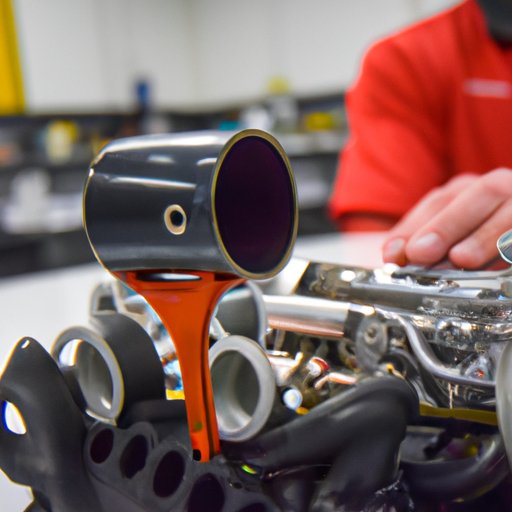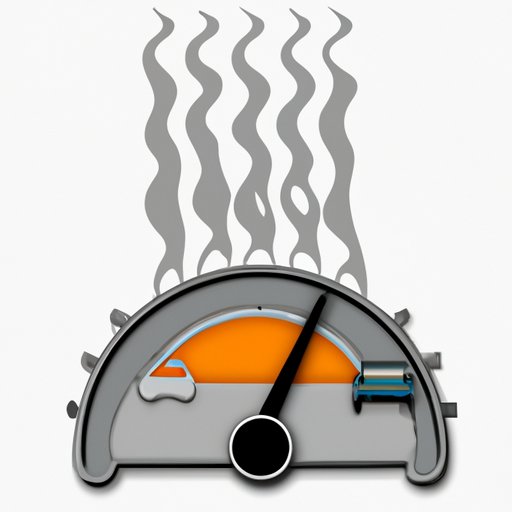Introduction
The temperature of an engine is a critical indicator of its performance and longevity. Knowing what the normal range of temperatures should be and understanding the consequences of temperature extremes can help maintain the efficiency of an engine and extend its life. This article will explore how hot engines get and the effects of these temperatures on performance, fuel consumption, and lifespan.

Investigating How Hot Engines Get and What That Means for Performance
When discussing engine temperature, it is important to understand that different types of engines operate at different temperatures. The temperature of a gasoline engine typically ranges from 160 to 240 degrees Fahrenheit, while diesel engines usually operate between 190 and 260 degrees Fahrenheit. The exact temperature of an engine depends on the specific type, size, and design of the engine, as well as the ambient temperature outside the engine and the load placed on it.
The heat generated by an engine is dependent on several factors, including the amount of fuel being burned and the rate at which it is being burned. Engines with higher compression ratios, such as turbocharged engines, generate more heat than those with lower compression ratios. Additionally, the type of fuel being used in the engine can affect the amount of heat generated; for example, gasoline burns hotter than diesel.
The relationship between engine temperature and fuel consumption is complex. Generally speaking, a cooler engine will consume less fuel than a hotter one, but there is no hard-and-fast rule. Factors such as the type of fuel being used, the ambient temperature, and the load placed on the engine all play a role in determining the amount of fuel consumed.
Analyzing the Effects of Overheating on an Engine’s Lifespan
Overheating is a serious issue for any engine. When an engine runs too hot, it can cause damage to the pistons, valves, and other components. In extreme cases, the engine can seize up, resulting in catastrophic failure. To avoid this, it is important to understand the signs of an overheated engine and take steps to prevent it.
The most common signs of an overheating engine include white smoke from the exhaust, an unusual odor, reduced power, and a decrease in fuel efficiency. If these symptoms are present, it is important to take action immediately. The first step is to reduce the load on the engine by reducing speed or shutting it down entirely. It is also important to check the coolant level and make sure it is full. If the coolant level is low, it could indicate a leak.
Preventative measures can also be taken to avoid overheating. Regularly checking the oil level and replacing it when necessary is important. Additionally, ensuring that the cooling system is functioning properly and performing regular maintenance on the engine can help prevent overheating. Finally, some engines are equipped with temperature sensors that can alert the driver if the engine is running too hot.
Understanding How to Regulate Engine Temperature for Optimal Performance
Regulating engine temperature is key to achieving optimal performance. This can be done through a variety of strategies, such as changing the air-to-fuel mixture, adding additional cooling fins to the engine, or installing a fan to increase air circulation. Additionally, the use of synthetic oils and coolants can help reduce engine temperatures.
Maintaining proper engine temperature has many benefits, including improved fuel efficiency, increased power, and extended engine life. Keeping the engine within its recommended temperature range will ensure that it runs efficiently and reliably for years to come.
Conclusion
In conclusion, it is important to understand how hot engines get and the potential effects of temperature extremes on engine performance, fuel consumption, and lifespan. Different types of engines run at different temperatures, and the temperature range can vary depending on the type, size, and design of the engine. Overheating can lead to severe damage and even engine failure, so it is important to take steps to prevent it. Finally, regulating engine temperature is essential for achieving optimal performance, fuel efficiency, and engine longevity.
By understanding how hot engines get and taking steps to regulate engine temperature, drivers can ensure that their vehicle runs smoothly and reliably for years to come.
(Note: Is this article not meeting your expectations? Do you have knowledge or insights to share? Unlock new opportunities and expand your reach by joining our authors team. Click Registration to join us and share your expertise with our readers.)
